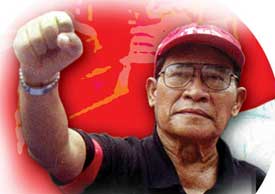Philippines labor leader released but harsh law passes
By
Dianne Mathiowetz
Published Jul 29, 2007 6:58 PM
Joyful celebrations were held in the Philippines and around the world on news
of the release of Crispin Beltran, a legendary labor leader and member of the
Philippines Parliament who had been charged on Feb. 25, 2006, with
“rebellion” against the government of President Gloria
Macapagal-Arroyo.
|
Crispin Beltran, known to the people
as ‘Ka Bel.’
|
Known as Ka Bel to millions of Filipino workers and peasants, Beltran has a
history of standing up for the rights and welfare of the poorest sectors of the
population going back more than 50 years. He was imprisoned and tortured during
the brutal U.S.-backed dictatorship of Ferdinand Marcos, headed the militant
workers’ organization known as KMU (May 1st Movement), and in 2001 was
elected to the Philippines Parliament.
As a representative of the Anakpawis (Toiling Masses) partylist, Ka Bel spoke
out forcefully against the fraudulent election of Gloria Macapagol-Arroyo,
championed the rights of migrant workers forced to leave the Philippines by the
extreme poverty epidemic throughout the country, and argued passionately for an
increase in the minimum wage.
In 2006, Arroyo’s government was in severe crisis with increasing popular
unrest over her policies of subservience to multinational corporate interests
and U.S. military plans. Continuous charges of corruption, graft and electoral
fraud made banner headlines in newspapers across the country. In addition, the
level of police and paramilitary violence and repression against all forms of
dissent during her term of office had reached unprecedented numbers, with
hundreds of activists killed, “disappeared” or imprisoned.
The gigantic gap between rich and poor is evident to the eye as soaring
luxurious hotels and condominiums tower over shantytowns made of cardboard
boxes and scraps of metal. Row after row of cash crops such as pineapple line
the rural roads while agricultural workers have little to eat. From the ranks
of the Catholic Church to students to the urban poor, there has been great
discontent with the Arroyo government.
In February 2006, as rumors spread of a coming military coup, she declared a
“state of emergency” and ordered the arrest of Crispin Beltran and
five other elected parliamentarians, plus other leaders of civil society, on
the bogus charge of “rebellion” for organizing opposition to the
state’s repressive policies.
After 16 months of legal motions and demonstrations, international petition
drives, rallies and other types of support for Beltran and the others, the
Philippines Supreme Court this July 10 rejected the government’s case and
ordered Ka Bel’s release, declaring him and his compatriots innocent of
the charges.
Despite international condemnation of the Arroyo government’s human
rights record, on July 11 the U.S. Congress appropriated $30 million for
military aid to the Philippines for fighting “terrorism.” This is
almost three times what the Bush administration had requested.
It is a clear indication that both big business parties in the U.S. share a
common view on the strategic importance of a compliant political proxy in the
Pacific. Declaring the Philippines the “second front on the war on
terrorism,” the Pentagon already has brought thousands of U.S. troops to
the Philippines to train Filipino soldiers.
U.S. forces have taken part in military operations against armed resistance
movements on various islands of the Philippines, including Mindanao, where
indigenous peoples and Moslem communities have remained unconquered since the
early 1900s, when the U.S. first gained control of the country.
The millions appropriated by Congress will be used to bolster the firepower of
the Filipino military and police, both of which have been accused of being
involved in more than 860 extrajudicial killings of activists from every sector
of Philippine society, from priests and archbishops to peasant and labor
leaders. In addition, some 200 members of various opposition groups have been
“disappeared” and another 200 imprisoned during the six and a half
years of the Arroyo presidency.
Just days after having $30 million more to spend on counterinsurgency weapons
and training, the Philippines Parliament passed the Human Security Act, a
measure similar to the USA Patriot Act, which expands the government’s
ability to curtail dissent in the name of fighting “terrorism.”
The HSA defines “terrorism” in such broad language that almost any
protest or campaign that “alarms” the population against a policy
advocated by the government could be subject to the law’s
jurisdiction.
Among its many dangerous and abusive provisions is one that allows anyone to be
arrested and held for three days without being charged. Still another section
provides for “extraordinary rendition,” the notorious policy of
sending a prisoner to another country—particularly one that uses
torture—to be interrogated.
Ka Bel, immediately upon his release from detention, appeared on the floor of
the Parliament to denounce the Human Security Act. Refusing to be intimidated,
the various movements in the Philippines have conducted protests and
demonstrations in many cities and towns, demanding its repeal.
Mathiowetz was part of an International Action Center delegation that
visited Crispin Beltran for several hours in December 2006 at a Manila
hospital, where he received medical treatment while under police
guard.
Articles copyright 1995-2012 Workers World.
Verbatim copying and distribution of this entire article is permitted in any medium without royalty provided this notice is preserved.
Workers World, 55 W. 17 St., NY, NY 10011
Email:
[email protected]
Subscribe
[email protected]
Support independent news
DONATE


